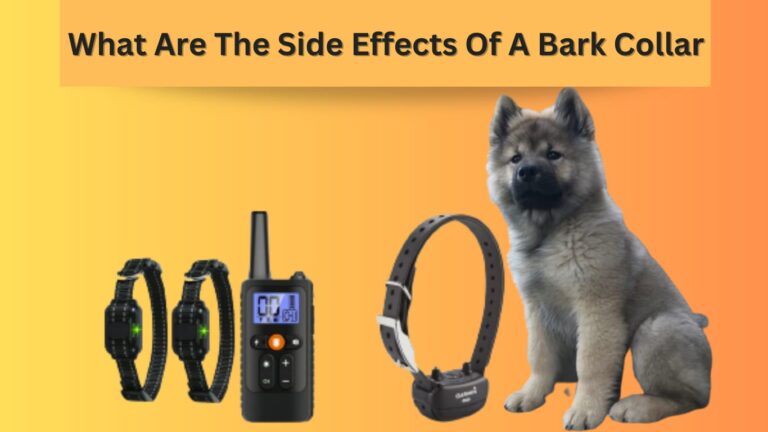Bark Collars: Do Bark Control Collars Work?

Do Bark Control Collars Work?
In the world of dog ownership, one common challenge that many pet parents face is excessive barking. It can be a source of frustration for both owners and neighbors. As a solution, do bark control collars work? The short answer is yes, they can be effective in curbing excessive barking. But let’s delve deeper into how these collars work, their safety, and whether they are the right choice for your furry companion.
Do Bark Control Collars Work? Unlocking the Truth
When considering the use of bark control collars, it’s crucial to take into account the individual needs and temperament of your dog. Some dogs may be more sensitive than others, and certain collar types, such as citronella spray collars or ultrasonic collars, may be more suitable for them. It’s advisable to consult with a professional dog trainer or veterinarian who can offer guidance on selecting the right collar for your specific canine companion. Moreover, it’s essential to use these collars as part of a comprehensive training program, rather than relying solely on the collar to address excessive barking. Consistent positive reinforcement and reward-based training methods should be integrated into the process to ensure your dog learns the desired behavior.
While bark control collars can be effective in reducing excessive barking, they should never be used as a punitive measure or a long-term solution. It’s vital to address the root causes of your dog’s barking, which could include boredom, anxiety, or a need for exercise and mental stimulation. Adequate exercise, socialization, and mental enrichment are key components of a well-rounded approach to managing your dog’s behavior. Ultimately, the decision to use a bark control collar should be made with your dog’s well-being in mind, and always with a focus on humane and responsible training methods that promote a happy and healthy relationship between you and your furry friend.
Understanding Bark Control Collars
Bark control collars, also known as anti-bark collars, are devices designed to reduce or eliminate unwanted barking in dogs. They come in various types, including citronella spray collars, ultrasonic collars, vibration collars, and static shock collars. Each type operates differently but shares the same goal: to discourage excessive barking.
How Do Bark Control Collars Work?
These collars are equipped with sensors that can detect barking. When your dog barks excessively, the collar activates and delivers a correction. For instance, static shock collars emit a mild static shock, while citronella spray collars release a burst of citronella spray. The idea is to associate the correction with barking, encouraging your dog to reduce or stop the behavior.
Are Bark Control Collars Safe?
Safety is a paramount concern for pet owners. When used correctly and following the manufacturer’s guidelines, bark control collars are generally safe. However, it’s crucial to ensure that the collar fits properly and is not too tight. Always consult with a veterinarian or professional trainer if you have any doubts about its safe use.
Effectiveness of Bark Control Collars
The effectiveness of bark control collars can vary from dog to dog. Some dogs respond well to these devices and quickly learn to reduce their barking. Others may take more time to adapt. Real-life success stories and testimonials from pet owners often highlight the positive impact of bark control collars.
Types of Dogs That Benefit
Bark control collars can be particularly beneficial for dogs that have a persistent barking problem. This includes breeds that are naturally more vocal or dogs that develop a habit of barking excessively. The key is to identify if your dog falls into this category and whether such a collar aligns with their training needs.
Choosing the Right Collar
Selecting the right bark control collar is essential. Consider your dog’s size, temperament, and the specific type of correction they may respond to best. Customization options, such as adjustable settings, ensure that the correction level is suitable for your dog’s comfort.
Training Alongside Bark Control Collars
While bark control collars can be effective, they work best when combined with proper training. Training reinforces the learning process and helps your dog understand when it’s appropriate to bark. Using positive reinforcement techniques alongside the collar can lead to better results.
Common Misconceptions
There are several misconceptions about bark control collars, such as the belief that they are harmful or inhumane. However, when used responsibly, these collars are designed to provide gentle corrections and are not intended to cause harm or distress to your dog. It’s essential to dispel such myths with evidence-based information.
Alternatives to Bark Control Collars
If you’re hesitant about using a bark control collar or if it doesn’t seem suitable for your dog, there are alternative methods to address excessive barking. These may include behavioral training, increased exercise, or consulting with a professional dog trainer.
User Experience and Reviews
To gain insight into the effectiveness of bark control collars, it’s helpful to consider the experiences of other pet owners. Many have found success in reducing unwanted barking with the use of these collars. However, it’s essential to read both positive and negative reviews to make an informed decision.
Conclusion
In conclusion, do bark control collars work? Yes, they can be effective tools in curbing excessive barking when used responsibly and in conjunction with proper training. Safety and the well-being of your dog should always be a top priority. By understanding how these collars work, choosing the right one, and combining them with positive reinforcement training, you can find a solution to excessive barking that benefits both you and your beloved pet.
This may also be helpful for you: What Are The Side Effects Of A Bark Collar?
Can You Leave A Bark Collar On All Night?
What Age Can You Use A Bark Collar On A Dog?
Will A Shock Collar Stop Two Dogs From Fighting?
FAQs
1. Are bark control collars safe for all dog breeds?
- Bark control collars can be safe for most breeds when used appropriately. However, consult with a professional for specific breed considerations.
2. How long does it take for a bark control collar to show results?
- Results can vary, but some dogs show improvement within days, while others may take a few weeks to respond effectively.
3. Can I leave a bark control collar on my dog all the time?
- It’s not recommended to keep the collar on continuously. Follow the manufacturer’s guidelines for usage duration.
4. Are there any humane alternatives to bark control collars?
- Yes, humane alternatives include positive reinforcement training and increased exercise to address the underlying causes of barking.
5. What should I do if my dog doesn’t respond to a bark control collar?
- If your dog doesn’t show improvement, consult with a professional dog trainer for personalized guidance and solutions.




